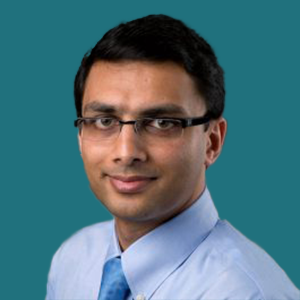More Work Will Be Needed to Harness the Full Potential of Patient Reported Outcomes Measurements
Akshay Sharma, MBBS, a bone marrow transplant physician at St. Jude Children’s Research Hospital, also gave his thoughts on the recent FDA approval of Vertex and CRISPR’s exa-cel for sickle cell disease.
This is the second part of an interview with Akshay Sharma, MBBS. For the first part, click here.
Akshay Sharma, MBBS

Patient reported outcomes (PRO) measures are emerging as a new method of interest for determining the impact of a novel treatment on patients’ daily activities. For example, in the realm of gene therapy, PROs were collected as a secondary end point during the phase 1/2/3 CLIMB-121 clinical trial (NCT03745287) that recently led to the approval of Vertex Pharmaceuticals and CRISPR Therapeutics’ autologous gene-edited cell therapy exagamglogene autotemcel (exa-cel; marketed as Casgevy) by the FDA.
Although this PRO data was not cited as a factor in the FDA’s decision to approve the therapy, the findings provide insight into exa-cel's positive effect on the day-to-day lives of treated patients. Akshay Sharma, MBBS, a bone marrow transplant physician at St. Jude Children’s Research Hospital, presented the data at the 2023 American Society of Hematology (ASH) Annual Meeting & Exposition, December 9-12, in San Diego, California. In an interview with CGTLive™ held shortly before the conference, Sharma discussed some of the challenges holding back the full potential of using PROs as an end point in clinical trials. He also shared his thoughts on exa-cel's approval by the FDA.
CGTLive: What are some of the challenges with collecting PROs and using them as an outcome measure in clinical trials?
Akshay Sharma, MBBS: One of the biggest challenges is that PRO data is recently beginning to be incorporated in clinical trials, especially in clinical trials of sickle cell disease. As such, we don't have a lot of baseline data available in this area. It is hard to compare this data [from exa-cel] to something else—let's say, [hypothetical] PRO data after undergoing a bone marrow transplant. We don't know how similar or how different the data that we have seen is to the data from other therapeutic modalities, which would have been very helpful to understand better: Is this particular treatment better than others? Or is it comparable to others?
Similarly, I think one of the other challenges is that there are a number of different instruments that are being used in the field right now. Different trials use different instruments to assess primarily the same thing, but the way those instruments are scored and graded is different and so there is also a challenge to compare across different studies that are collecting PRO data. From my perspective, one of the challenges is that we need to harmonize and standardize how we collect this data across different clinical trials and across different treatment modalities so that eventually we can compare the outcomes data that has been obtained from different clinical trials from different therapies and then actually be able to make sound decisions about whether one treatment is really superior to or equivalent to another treatment. Right now, all we can say is that there is an improvement within these patients from their baseline to 6 months, 12 months, [and] 24 months, which is in itself an important outcome measure, but it doesn't allow us comparison between different studies.
Do you have any thoughts on the approval of exa-cel by the FDA, which just took place today [December 8, 2023]?
Exa-cel and bluebird bio’s lovotibeglogene autotemcel were just approved just approved by the FDA a few hours ago so this is really an exciting time to be in the field. Many people don't know, but sickle cell disease was one of the first genetic diseases whose molecular basis was identified, more than 50 years ago. Primarily because of the population that it affects (in the US, it's African-Americans and in the rest of the world it's individuals of African and South Asian origin) it has been a neglected disease. From where I stand as a provider who takes care of patients with sickle cell disease it's a really exciting time to be in the field. Having said that, though, I am a little bit skeptical, because of the price tag for these therapies, which is $2 million to $3 million.
How many patients will actually be able to afford these therapies in the short term? And that's [just] within the US. The major burden of sickle cell disease in the world is in sub-Saharan Africa and Southeast Asia. So how are individuals in those countries going to ever be able to afford these therapies? I think that remains a question mark. From a global perspective, I think all this data is really exciting, but what we really need to now work towards and where the real work now begins is to make these therapies accessible and affordable for people who actually need them—because if there's a therapy which works really well, but most people can't access it, then that's not an effective therapy.
This transcript has been edited for clarity.
REFERENCES
1. FDA Approves First Gene Therapies to Treat Patients with Sickle Cell Disease. News release. FDA. December 7, 2023. Accessed December 18, 2023. https://www.fda.gov/news-events/press-announcements/fda-approves-first-gene-therapies-treat-patients-sickle-cell-disease
2. Sharma A, Frangoul H, Mapara M, et al. Improvements in health-related quality of life after exagamglogene autotemcel in patients with severe sickle cell disease. Presented at: ASH 2023 Annual Meeting & Exposition. December 9-12; San Diego, CA. Abstract #4999
Considerations for Administering Hemoglobinopathy Gene Therapies From a Pharmacist’s Perspective
April 20th 2024Alexis Kuhn, PharmD, BCOP, a pediatric oncology pharmacist at Mayo Clinic, discussed the incorporation of the recently FDA-approved gene therapies for SCD and TDT into the work of pharmacists.